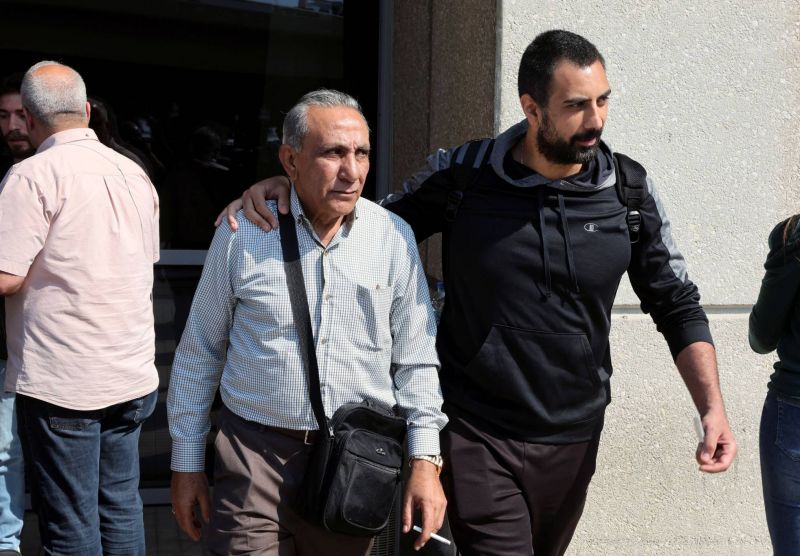
Lebanese citizens, who were evacuated from Sudan, walk outside Beirut airport, Lebanon April 25, 2023. (Credit : REUTERS/Mohamed Azakir)
BEIRUT — Thirty-two people, representing the second batch of evacuees from war-torn Sudan, arrived at Beirut's airport on early Wednesday morning, the state-run National News Agency reported.
The new batch includes 20 Lebanese people and 12 Palestinians, all of whom hold Lebanese documents.
The first batch of evacuees from Sudan, comprising of 12 people of Lebanese, Palestinian and Syrian nationalities, had arrived on Tuesday, caretaker Foreign Affairs Minister Abdallah Bou Habib announced.
Bou Habib welcomed the evacuees at the airport yesterday, announcing that 32 more people are expected to arrive in Beirut later.
Wednesday's evacuees were met at the airport by Higher Relief Commission head Muhammad Kheir, who said a third batch of 18 people would arrive later in the day.
"Cooperation took place with the Sudanese ambassador in Jeddah and the Lebanese Consul General in Jeddah, Walid Minkara, to solve the problem of renewing passports for the children of a Lebanese woman married to a Sudanese citizen," Kheir added.
The exact number of evacuees remains unclear. A spokesperson at Lebanon's Foreign Affairs Ministry told L’Orient Today on Monday that 54 people were evacuated from Sudan aboard a Royal Saudi Navy ship that departed the city of Port Sudan and was on its way to Jeddah, Saudi Arabia.
However, the Foreign Affairs Ministry tweeted Monday that 52 people were evacuated, and a statement published by the head of the Higher Relief Committee (HRC), Mohammed Kheir, listed 57 names, noting that the evacuees included 33 Lebanese, 17 Palestinians and seven Syrians.
Sudan's only maritime access is on the Red Sea, facing Saudi Arabia.
Bou Habib has also extended gratitude on Tuesday to the United Arab Emirates and Saudi Arabia, "as the UAE has contributed to securing the transfer of the Lebanese people by land to Port Sudan," adding that "it was the Kingdom of Saudi Arabia who secured their transfer by sea to Jeddah and hosted them there, then they were transferred to Beirut."
"What also helped us was that a large number of the Lebanese community in Sudan were in Lebanon during the holidays," Bou Habib added, indicating that are 100 Lebanese nationals in Sudan.
"We were able to evacuate approximately 70 of them, from Sunday until today, and we are ready to receive calls from those remaining there," he said.
Evacuations by other Arab States
Saudi Arabia led the first large-scale evacuations Saturday by sea, and since then hundreds of Saudis and foreigners from more than 20 countries have been taken to the port city of Jeddah.
The United Arab Emirates said it had "evacuated its citizens" to Port Sudan and was hosting people from 19 other countries who had been rescued.
Jordan late Sunday airlifted nearly 350 people including Palestinians, Iraqis, Syrians and Germans to a military airport in the kingdom, and on Monday announced "20 Jordanians arrived" aboard a German plane.
Egypt on Sunday said 436 citizens had left by land. More than 10,000 Egyptians are thought to live in Sudan.
Over 200 Moroccans reached Port Sudan in convoys organized by their embassy, Rabat said Monday.
Mauritania said 101 citizens had also made it to the Red Sea port city.
Algeria, Tunisia and South Africa have also announced rescue operations.
Chad said it was sending planes to collect 438 citizens from Port Sudan.
Mali said on Tuesday that 55 citizens had arrived at Sudan's border with Ethiopia and another group of 14 people was on its way there.
Kenya, with about 3,000 citizens in Sudan, evacuated 38 Kenyans, Somalis and a Saudi national, who landed in Nairobi on Monday night.
Nigeria plans to get nearly 3,000 nationals, mostly students, out by convoy to Egypt this week, an official said Monday.
Uganda has evacuated more than 200 nationals on buses via Ethiopia, its ambassador told AFP.
Ivory Coast said 47 citizens were headed by bus from Khartoum to Cairo.
Violence broke out in Sudan on April 15 between the army of Gen. Abdel Fattah al-Burhane, Sudan's de facto ruler since a 2021 coup overthrew the government of Omar al-Bashir, and his deputy-turned-rival, Gen. Mohamed Hamdan Dagalo, who commands the paramilitary Rapid Support Forces.
Fighting has since continued despite a number of attempted cease-fires.